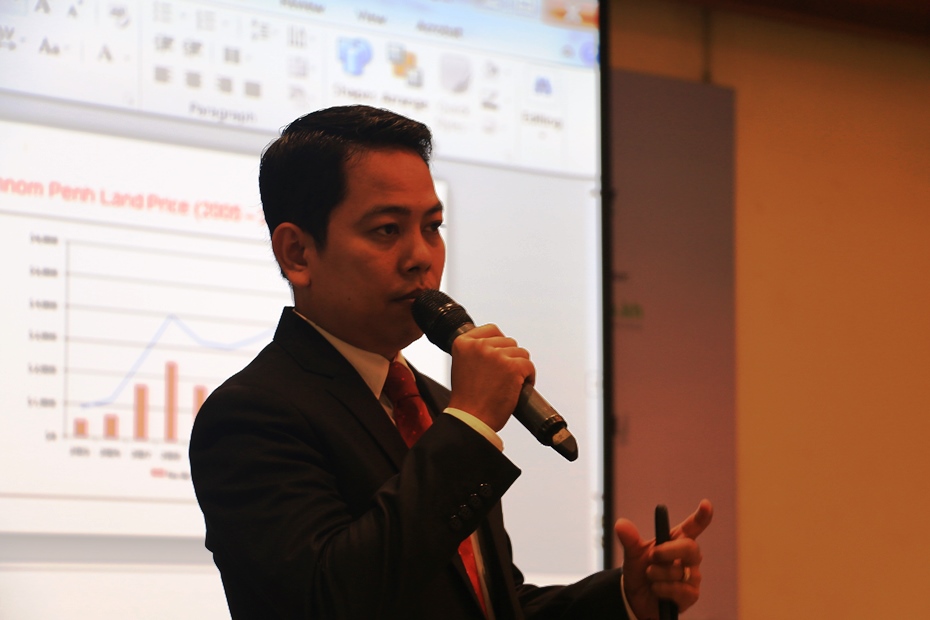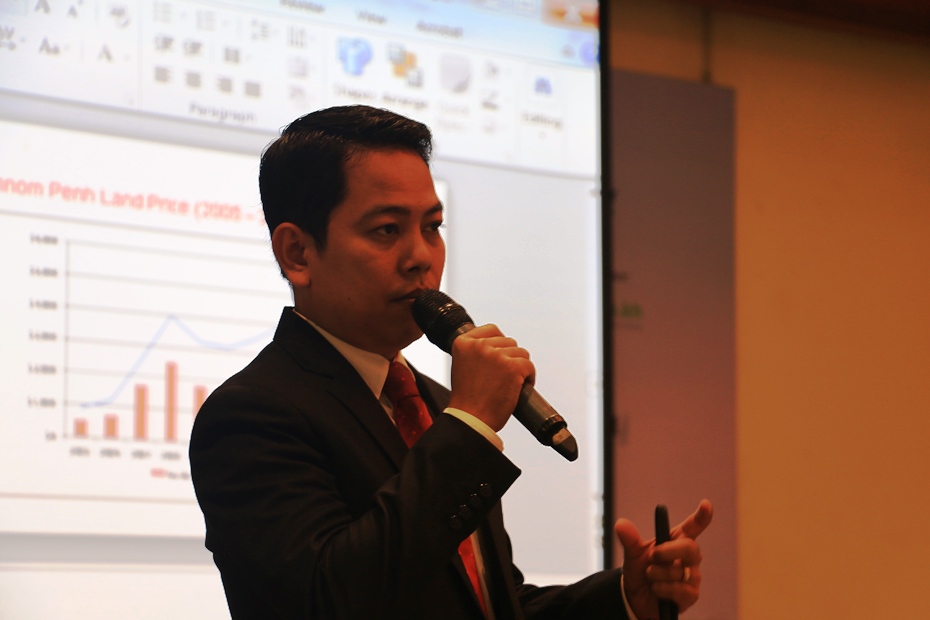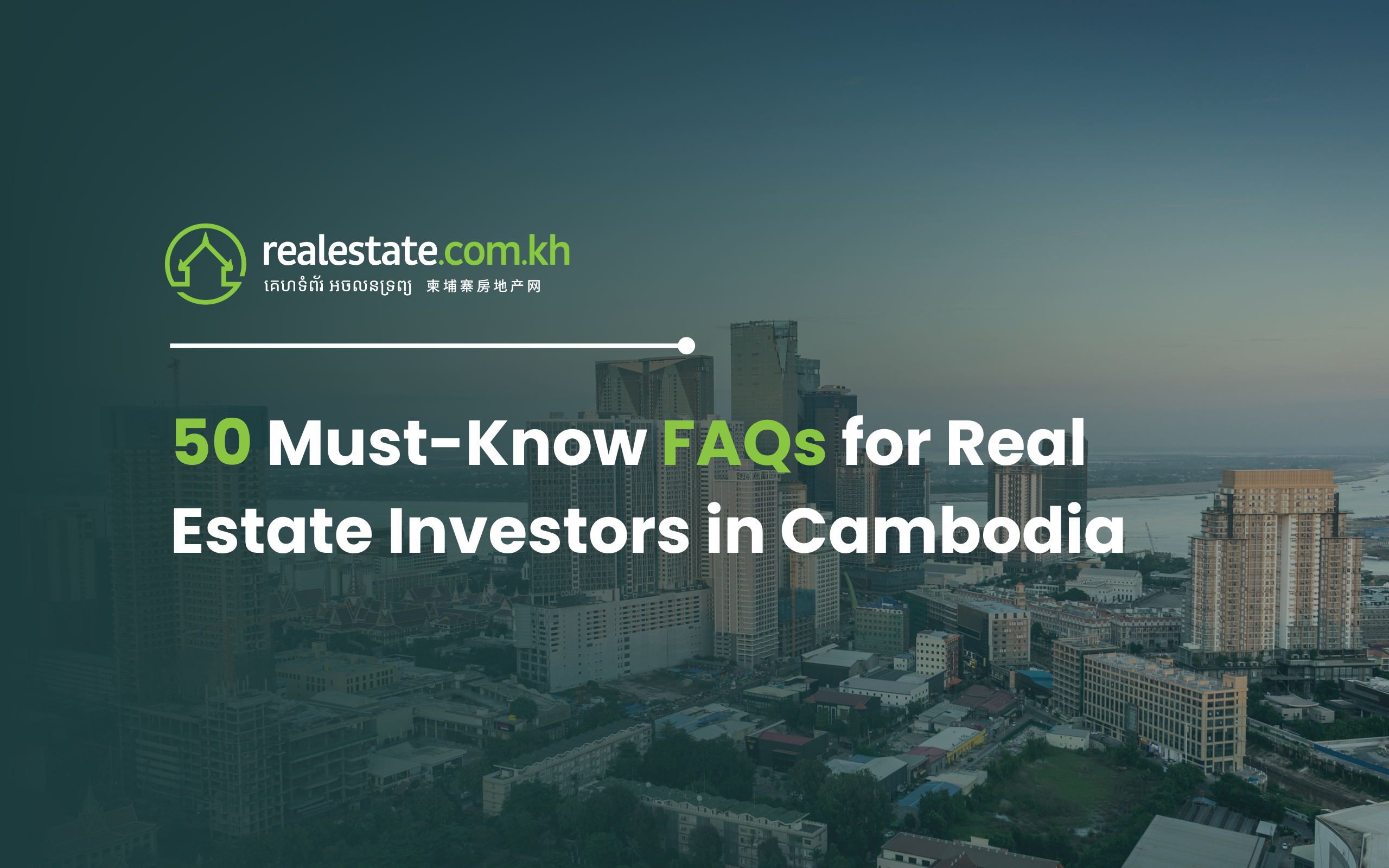 Rising again from an economic depression in 2008, Cambodia has resolved to rise above expectations and circumstance.
According to Director of Key Real Estate, Sorn Seap, in his presentation at the Real Estate Market and Outlook Conference (REMOC) 2016, this has manifested and converted into promising Phnom Penh land price figures in the years following the economic upset.
Though, he suggests we are now in the middle of a golden economic era, Cambodia still has its fair share of things to address for sustainable success in the Phnom Penh land market.
In a sector as big as the land market, progress does not come without sacrificing a few details. This is especially true in the Phnom Penh area where progress is most prolific. As foreign investors move in and new developments such as bridges and roads are built, a display of both positive and negative impacts has become apparent, says Sorn.
One such impact is the decreased rate of progress in the condominium market at the start of 2016. Asia Real Estate general manager, Po Eavkong, in his interview with the Phnom Penh Post, said that sales decreased 30 per cent because of a high supply of units and high saturation of developments across the city. This has forced developers to reduce unit prices. This was a similar conclusion made by Hoem Seiha, the director of research for VTrust Appraisal, during his presentation at the REMOC2016 conference, too.
While other segments reap rewards for their early developments coming online while the market is strong, it is the developers launching now that may experience the effects of the plummeting statistics.
Another concern Seap mentions that may affect the Phnom Penh land market is the increase in Phnom Penh land prices generally. Phnom Penh has been one of the most sought after areas to invest in to buy undeveloped land to build properties on. Many foreign investors have been quick to grab the free land in Phnom Penh, and with no shortage of upfront capital to spend. Unfortunately, along with the high demand came higher and higher Phnom Penh land prices.
The CVEA, in discussions last December, talked about the Phnom Penh land market prices. The 80+ real estate and valuation companies that make up the Association came to an agreement that Phnom Penh’s average land market price for 2015 was about $3,050 per square meter.
However, this is more than double the amount from a report released by VTrust Appraisal in its Journal of Real Estate – Volume 1, Issue 2 – where the average asking price was only at $1,140 per square meter.
But this may not affect foreign companies looking to place their money in the local land market. Phnom Penh land prices are still relatively low compared to neighboring countries. The effects will more likely be felt by local developers and investors who are planning to purchase in the area of Phnom Penh. Further, it is felt by the lower class buyers now essentially blocked from the inner city Phnom Penh land market by high costs of entry.
Though this may cause difficulties with future projects, this will also mean good news for suburbs of Phnom Penh that have garnered less attention than the four major areas of Phnom Penh dominated by investment thus far, namely Chamkarmorn, Daun Penh, Toul Kork and 7 Makara.
Traditionally less-popular areas of the Phnom Penh land market will now receive the necessary support for them to gain investment in their real estate development, suggests Sorn. As development moves further away from the CBD, there will come a time that land prices will lower somewhat in the prime quarters and reach an equilibrium that is both beneficial and stable for the whole of the city; and the Cambodian real estate market generally.
The first quarter seems like it has hit a roadblock of sorts, but with a change in strategy and government/private sector policies, a lot can happen in the remaining quarters of 2016.
Rising again from an economic depression in 2008, Cambodia has resolved to rise above expectations and circumstance.
According to Director of Key Real Estate, Sorn Seap, in his presentation at the Real Estate Market and Outlook Conference (REMOC) 2016, this has manifested and converted into promising Phnom Penh land price figures in the years following the economic upset.
Though, he suggests we are now in the middle of a golden economic era, Cambodia still has its fair share of things to address for sustainable success in the Phnom Penh land market.
In a sector as big as the land market, progress does not come without sacrificing a few details. This is especially true in the Phnom Penh area where progress is most prolific. As foreign investors move in and new developments such as bridges and roads are built, a display of both positive and negative impacts has become apparent, says Sorn.
One such impact is the decreased rate of progress in the condominium market at the start of 2016. Asia Real Estate general manager, Po Eavkong, in his interview with the Phnom Penh Post, said that sales decreased 30 per cent because of a high supply of units and high saturation of developments across the city. This has forced developers to reduce unit prices. This was a similar conclusion made by Hoem Seiha, the director of research for VTrust Appraisal, during his presentation at the REMOC2016 conference, too.
While other segments reap rewards for their early developments coming online while the market is strong, it is the developers launching now that may experience the effects of the plummeting statistics.
Another concern Seap mentions that may affect the Phnom Penh land market is the increase in Phnom Penh land prices generally. Phnom Penh has been one of the most sought after areas to invest in to buy undeveloped land to build properties on. Many foreign investors have been quick to grab the free land in Phnom Penh, and with no shortage of upfront capital to spend. Unfortunately, along with the high demand came higher and higher Phnom Penh land prices.
The CVEA, in discussions last December, talked about the Phnom Penh land market prices. The 80+ real estate and valuation companies that make up the Association came to an agreement that Phnom Penh’s average land market price for 2015 was about $3,050 per square meter.
However, this is more than double the amount from a report released by VTrust Appraisal in its Journal of Real Estate – Volume 1, Issue 2 – where the average asking price was only at $1,140 per square meter.
But this may not affect foreign companies looking to place their money in the local land market. Phnom Penh land prices are still relatively low compared to neighboring countries. The effects will more likely be felt by local developers and investors who are planning to purchase in the area of Phnom Penh. Further, it is felt by the lower class buyers now essentially blocked from the inner city Phnom Penh land market by high costs of entry.
Though this may cause difficulties with future projects, this will also mean good news for suburbs of Phnom Penh that have garnered less attention than the four major areas of Phnom Penh dominated by investment thus far, namely Chamkarmorn, Daun Penh, Toul Kork and 7 Makara.
Traditionally less-popular areas of the Phnom Penh land market will now receive the necessary support for them to gain investment in their real estate development, suggests Sorn. As development moves further away from the CBD, there will come a time that land prices will lower somewhat in the prime quarters and reach an equilibrium that is both beneficial and stable for the whole of the city; and the Cambodian real estate market generally.
The first quarter seems like it has hit a roadblock of sorts, but with a change in strategy and government/private sector policies, a lot can happen in the remaining quarters of 2016.

Updated on: June 6, 2022, 5:05 p.m.
Published on: May 21, 2016, 10:36 a.m.
Phnom Penh Land Prices Seek Predictability, says Key Real Estate
 Rising again from an economic depression in 2008, Cambodia has resolved to rise above expectations and circumstance.
According to Director of Key Real Estate, Sorn Seap, in his presentation at the Real Estate Market and Outlook Conference (REMOC) 2016, this has manifested and converted into promising Phnom Penh land price figures in the years following the economic upset.
Though, he suggests we are now in the middle of a golden economic era, Cambodia still has its fair share of things to address for sustainable success in the Phnom Penh land market.
In a sector as big as the land market, progress does not come without sacrificing a few details. This is especially true in the Phnom Penh area where progress is most prolific. As foreign investors move in and new developments such as bridges and roads are built, a display of both positive and negative impacts has become apparent, says Sorn.
One such impact is the decreased rate of progress in the condominium market at the start of 2016. Asia Real Estate general manager, Po Eavkong, in his interview with the Phnom Penh Post, said that sales decreased 30 per cent because of a high supply of units and high saturation of developments across the city. This has forced developers to reduce unit prices. This was a similar conclusion made by Hoem Seiha, the director of research for VTrust Appraisal, during his presentation at the REMOC2016 conference, too.
While other segments reap rewards for their early developments coming online while the market is strong, it is the developers launching now that may experience the effects of the plummeting statistics.
Another concern Seap mentions that may affect the Phnom Penh land market is the increase in Phnom Penh land prices generally. Phnom Penh has been one of the most sought after areas to invest in to buy undeveloped land to build properties on. Many foreign investors have been quick to grab the free land in Phnom Penh, and with no shortage of upfront capital to spend. Unfortunately, along with the high demand came higher and higher Phnom Penh land prices.
The CVEA, in discussions last December, talked about the Phnom Penh land market prices. The 80+ real estate and valuation companies that make up the Association came to an agreement that Phnom Penh’s average land market price for 2015 was about $3,050 per square meter.
However, this is more than double the amount from a report released by VTrust Appraisal in its Journal of Real Estate – Volume 1, Issue 2 – where the average asking price was only at $1,140 per square meter.
But this may not affect foreign companies looking to place their money in the local land market. Phnom Penh land prices are still relatively low compared to neighboring countries. The effects will more likely be felt by local developers and investors who are planning to purchase in the area of Phnom Penh. Further, it is felt by the lower class buyers now essentially blocked from the inner city Phnom Penh land market by high costs of entry.
Though this may cause difficulties with future projects, this will also mean good news for suburbs of Phnom Penh that have garnered less attention than the four major areas of Phnom Penh dominated by investment thus far, namely Chamkarmorn, Daun Penh, Toul Kork and 7 Makara.
Traditionally less-popular areas of the Phnom Penh land market will now receive the necessary support for them to gain investment in their real estate development, suggests Sorn. As development moves further away from the CBD, there will come a time that land prices will lower somewhat in the prime quarters and reach an equilibrium that is both beneficial and stable for the whole of the city; and the Cambodian real estate market generally.
The first quarter seems like it has hit a roadblock of sorts, but with a change in strategy and government/private sector policies, a lot can happen in the remaining quarters of 2016.
Rising again from an economic depression in 2008, Cambodia has resolved to rise above expectations and circumstance.
According to Director of Key Real Estate, Sorn Seap, in his presentation at the Real Estate Market and Outlook Conference (REMOC) 2016, this has manifested and converted into promising Phnom Penh land price figures in the years following the economic upset.
Though, he suggests we are now in the middle of a golden economic era, Cambodia still has its fair share of things to address for sustainable success in the Phnom Penh land market.
In a sector as big as the land market, progress does not come without sacrificing a few details. This is especially true in the Phnom Penh area where progress is most prolific. As foreign investors move in and new developments such as bridges and roads are built, a display of both positive and negative impacts has become apparent, says Sorn.
One such impact is the decreased rate of progress in the condominium market at the start of 2016. Asia Real Estate general manager, Po Eavkong, in his interview with the Phnom Penh Post, said that sales decreased 30 per cent because of a high supply of units and high saturation of developments across the city. This has forced developers to reduce unit prices. This was a similar conclusion made by Hoem Seiha, the director of research for VTrust Appraisal, during his presentation at the REMOC2016 conference, too.
While other segments reap rewards for their early developments coming online while the market is strong, it is the developers launching now that may experience the effects of the plummeting statistics.
Another concern Seap mentions that may affect the Phnom Penh land market is the increase in Phnom Penh land prices generally. Phnom Penh has been one of the most sought after areas to invest in to buy undeveloped land to build properties on. Many foreign investors have been quick to grab the free land in Phnom Penh, and with no shortage of upfront capital to spend. Unfortunately, along with the high demand came higher and higher Phnom Penh land prices.
The CVEA, in discussions last December, talked about the Phnom Penh land market prices. The 80+ real estate and valuation companies that make up the Association came to an agreement that Phnom Penh’s average land market price for 2015 was about $3,050 per square meter.
However, this is more than double the amount from a report released by VTrust Appraisal in its Journal of Real Estate – Volume 1, Issue 2 – where the average asking price was only at $1,140 per square meter.
But this may not affect foreign companies looking to place their money in the local land market. Phnom Penh land prices are still relatively low compared to neighboring countries. The effects will more likely be felt by local developers and investors who are planning to purchase in the area of Phnom Penh. Further, it is felt by the lower class buyers now essentially blocked from the inner city Phnom Penh land market by high costs of entry.
Though this may cause difficulties with future projects, this will also mean good news for suburbs of Phnom Penh that have garnered less attention than the four major areas of Phnom Penh dominated by investment thus far, namely Chamkarmorn, Daun Penh, Toul Kork and 7 Makara.
Traditionally less-popular areas of the Phnom Penh land market will now receive the necessary support for them to gain investment in their real estate development, suggests Sorn. As development moves further away from the CBD, there will come a time that land prices will lower somewhat in the prime quarters and reach an equilibrium that is both beneficial and stable for the whole of the city; and the Cambodian real estate market generally.
The first quarter seems like it has hit a roadblock of sorts, but with a change in strategy and government/private sector policies, a lot can happen in the remaining quarters of 2016.



Comments